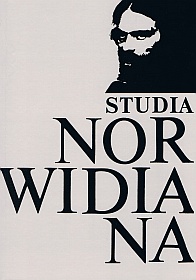Epistolary creation of a community. On Cyprian Norwid’s letter conversations
Abstract
The article is concerned with the meta-epistolary layer of Cyprian Norwid’s correspondence and the author’s original conception of the letter and letter-writing resulting from it. It proves the poet’s knowledge of genology, his sound expertise in history and poetics of the letter, as well as his need to transgress the conventions petrified by them, the conventions that are associated with this form of expression. In Norwid’s interpretation the letter is situated in the borderland of various fields of human activity and experience; it is created in the point where realities of life, interpersonal and social communication and the art of the word cross; it forms esthetic and extra-esthetic, extra-text values; it interferes with the course of events (that form biographies of individuals, history of nations, history of man), and first of all with the world of worth. Epistolography proves to be a significant area of Norwid’s experiments with prose; the poet joins narrative with discursive prose here, as well as with poetical and dramatic forms. However, the idea of a letter as a conversation is the key one for the poet. It is developed in numerous creative decisions made by Norwid-epistolographer, such as e.g. blurring the line between the spoken and written word; the inner conversation character of the letter; de-conventionalization of the apostrophes to the addressees and of the farewell formulas, which makes the letter close to the situation of a live conversation; exhibiting the formal imperfection of the letter and its sketchy character; limiting the role of the epistolary subject as a subject of an intimate confession, in favor of the I – You relation, a close connection between the letter and life as well as the letter and the truth. In an epistolary expression understood in this way the center of gravity rests on its inter-subjectivity, on the social value of the letter, on the inter-personal bond and its quality. Hence Norwid favors the conception of epistolary communication as symbolic actions, among which creating a community that has the Truth in its center comes to the fore. In the context of the 19th century transformations of epistolography directed to its autobiographization and, as a result, also to a communication crisis, Norwid’s conception of the letter maintains its separate identity. Preferring the conversation model of the letter, treating it as a part of life, a social form, a means of inter-human communication, of creating a community of thought, emotions and values, Norwid-epistolographer resists the tendencies typical of his times.
Copyright (c) 2014 Studia Norwidiana

This work is licensed under a Creative Commons Attribution-NonCommercial-NoDerivatives 4.0 International License.





